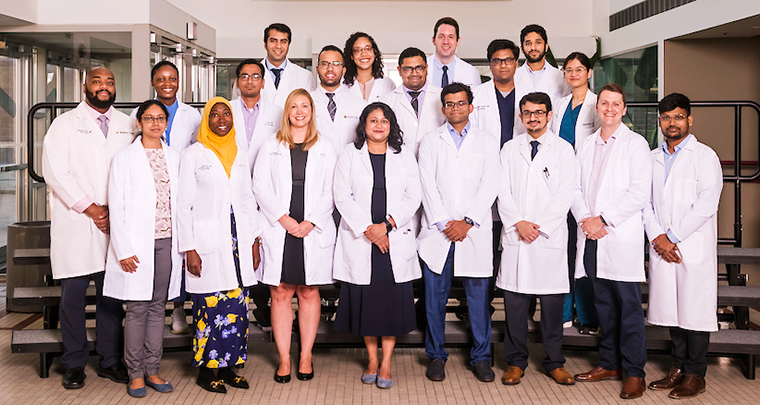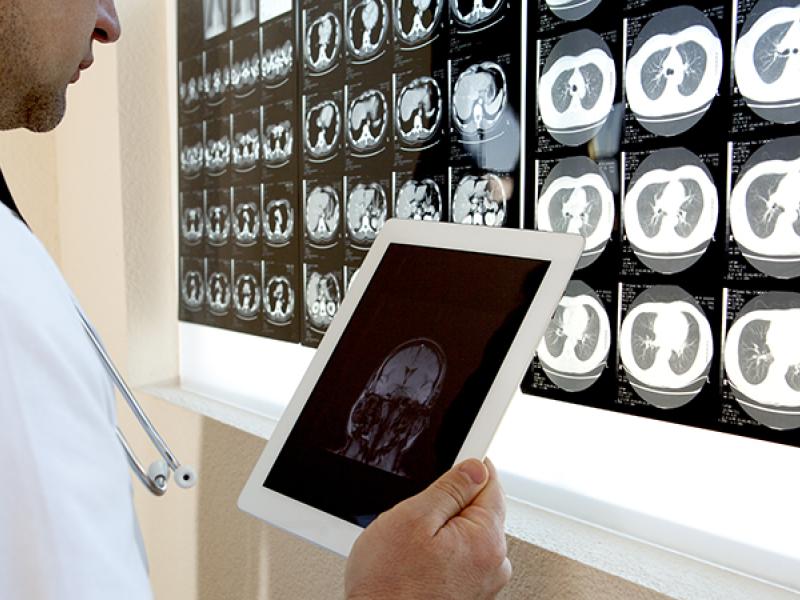Neurology faculty members are deeply invested in research.

Pradeep Sahota, MD, FAAN, FANA, FAASM, FAES, FACP
Dr. Sahota has participated in more than 40 clinical research studies mostly with external funding, more than 50 peer-reviewed publications, more than 80 abstracts and paper presentations, and several book chapters. He is co-editor of book on sleep disorders. Dr. Sahota served as site reviewer for accreditation of a sleep center, and has served as an ad-hoc reviewer for several journals. He has won multiple awards for excellence in teaching including the Best Neuroscience Teacher award, MUlation award (to honor teachers that MU medical student choose to emulate) and the Order of Socrates.
Dr. Sahota has served in various institutional, state, national and international bodies – most in neurology and sleep medicine. Selected ones include: Accreditation Council of the United Commission for Neurologic Subspecialties (UCNS); Program Accreditation and Development subcommittee of the American Academy of Neurology (AAN)(member, chair); Education Committee of AAN (member); Board of Governors - University of Missouri Medical Alumni Association; Sleep research group of World Federation of Neurology (served as chair, currently member); Association of Indian Neurologists in America (AINA; member and president). Dr. Sahota is humbled that a contribution was made to AAN foundation recently by one of his previous residents to honor him. He is privileged to have had such trainees who think of him in those terms and support the mission of Neurology and AAN.
Mahesh Thakkar, PhD
The Basic Sleep Research Division at the Department of Neurology is located in the Harry S. Truman Memorial Veterans' Hospital. National Institutes of Health-funded projects currently investigate the neural regulation of the sleep-wakefulness cycle, neurobiology of sleep loss and sleep disorders. These projects seek to understand the neurobiological and behavioral consequences of sleep loss using rodents as animal models. Sleep disorders affect a significantly large percentage of the population. Excessive daytime sleepiness, a shared symptom of chronic sleep loss impairs occupational performance and safety, as well as impacting on general health and the quality of life. An understanding of how the brain regulates natural sleep and responds to sleep loss holds the promise of providing a basis for the development of treatments for sleep disorders such as sleep apnea, narcolepsy, and insomnia. Basic research on endogenous neural sleep factors, such as adenosine, could lead to a new generation of medications to treat insomnia or, conversely, promote attention & vigilance. The laboratory uses diverse methods to address these questions, including molecular/biochemical, electrophysiological and behavioral approaches.
Asgar Zaheer, MD
Dr. Asgar Zaheer, PhD is the director of the MU Center for Translational Neuroscience and professor of neurology. Zaheer’s research, which is funded by the National Institutes of Health and a U.S. Department of Veterans Affairs Merit Review Award, focuses on properties and functions of Glia Maturation Factor, a brain-specific protein discovered by his lab. His research uses multidisciplinary approaches to understand the functions of the protein and the regulation of inflammatory signaling pathways relevant to neurodegenerative diseases such as multiple sclerosis, Alzheimer’s disease and Parkinson’s disease.
Center for Translational Neuroscience
David Beversdorf, MD
Dr. Beversdorf is currently involved in research on autism, creativity, dementia, cognitive effects of stress, the cognitive neuroscience of problem solving ability, functional neuroimaging, and pharmacological modulation of cognition. His work has been published in journals such as Neurology, Journal of Neurology Neuroscience and Psychiatry, Proceedings of the National Academy of Sciences of the United State of America and Lancet. He is also actively involved in the Brain Imaging Center at the University of Missouri. His research has been funded by National Institute of Neurological Diseases and Stroke, National Institute On Drug Abuse, the Stallone Fund, the Health Resources and Services Administration, and the National Alliance for Autism Research. He has joined the University of Missouri in the departments of Radiology, Neurology, Psychological Sciences and the Thompson Center as an associate professor to focus on the field of autism, with particular interest in pharmaco-functional neuroimaging as a potential treatment marker, and gene/stress interactions in the development of autism.
Cognitive Neuroscience Laboratory
Current projects
- The relationship between serotonin polymorphisms and prenatal stressors in children with autism
- Rodent model of the effect of prenatal stress on social behavior
- Noradrenergic modulation of cognitive flexibility in autism
- fMRI demonstration of noradrenergic modulation of functional connectivity in autism
- fMRI demonstration of functional connectivity in effects of stress
- MR spectroscopy as a predictor of treatment response in ASD
- Psychophysiological markers of medical comorbidities in ASD
- Effects of propranolol on social interaction and language in ASD
- Rodent model of the effects of the noradrenergic system on cognitive flexibility





